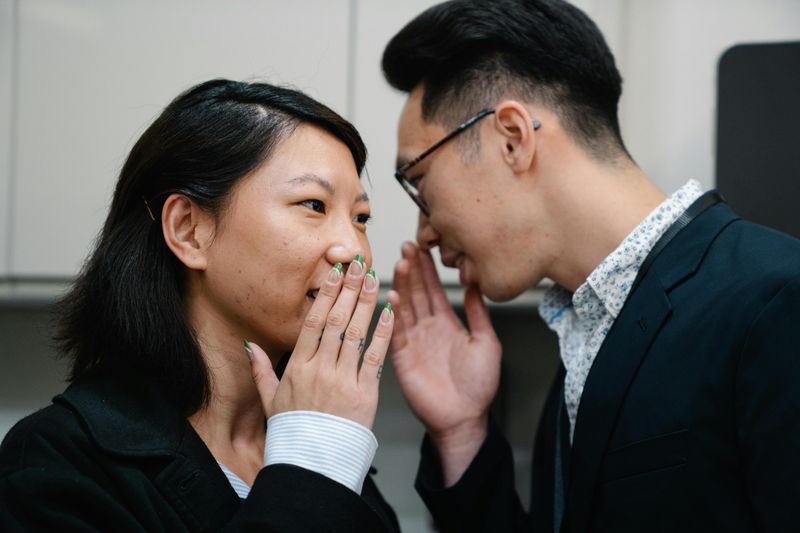13 Signs Someone’s Faking Friendship With You

Friendships are meant to be genuine connections built on trust and mutual respect. Unfortunately, not everyone who claims to be your friend has your best interests at heart. Recognizing when someone is pretending to be your friend can save you from emotional distress and wasted time. Here are thirteen telltale signs that someone might be faking their friendship with you.
1. They Only Contact You When They Need Something

These friends have a knack for disappearing until it’s convenient—then your phone lights up as they ask for help with moving or money.
Once their needs are met, they vanish again until their next request. The relationship feels unbalanced because you’re always giving while they’re always taking.
Real friends maintain contact regardless of whether they need something from you. They check in regularly and show genuine interest in your life even when there’s nothing in it for them.
2. Conversations Are Always Shallow

Notice how your interactions never go beyond surface-level chatter about the weather or generic small talk. When you attempt to discuss something meaningful or personal, they quickly change the subject or give vague responses.
Authentic connections involve depth and vulnerability. Someone faking friendship avoids these deeper conversations because they require genuine emotional investment they’re not willing to give.
They keep things superficial because maintaining the appearance of friendship is easier than building a real one. Their goal is social convenience, not meaningful connection.
3. They Gossip About You Behind Your Back

You notice red flags when mutual friends exchange strange glances or bring up remarks your supposed friend made behind your back. Genuine friends talk to you openly about any issues.
Someone faking friendship might share your secrets or mock your insecurities when you’re not around. This behavior reveals their lack of respect and loyalty—core elements of genuine friendship.
Pay attention if information you’ve only shared with them somehow becomes public knowledge. A pattern of betrayed confidences indicates they value social currency over your trust and feelings.
4. They Compete Instead of Celebrate

Good news in your life should bring congratulations, not comparison. Fake friends immediately shift focus to their own achievements when you share successes.
Their responses sound like “That’s nice, but I just…” followed by something they’ve done that they believe tops your accomplishment. This competitive attitude reveals they see you as a rival rather than someone to support.
True friends celebrate your wins without feeling threatened by them. They show genuine happiness for your success instead of trying to one-up you or diminish your achievements to protect their ego.
5. You Feel Drained After Spending Time With Them

After hanging out with energy vampires, you feel worn out rather than refreshed, and your intuition quietly signals that something doesn’t feel right, even if you can’t say why.
This emotional fatigue happens because maintaining a relationship with someone who isn’t authentic requires constant mental effort. You’re unconsciously working to navigate their hidden agendas and insincerity.
Healthy friendships should generally leave you feeling uplifted, supported, or at peace. If you consistently feel worse after interactions, your body might be recognizing what your mind hasn’t yet accepted.
6. They Disappear During Tough Times

Crisis moments reveal true character. When life gets difficult—you lose a job, face health problems, or experience a breakup—fake friends suddenly become too busy to support you.
Their excuses pile up precisely when you need them most. Meanwhile, people you might not have considered close friends show up with surprising reliability and compassion.
Authentic friendships strengthen during hardship rather than dissolving. Someone who consistently vanishes when things get tough is demonstrating they’re only interested in the fun, easy parts of friendship without the responsibility of emotional support.
7. They Only Show Interest in Public

Their friendship shines brightest online, where they tag you, flood your posts with excited comments, and pretend to be your biggest supporter in front of an audience.
Behind closed doors, however, they’re nowhere to be found. This dramatic difference between their public and private behavior reveals they value the appearance of friendship more than the actual relationship.
Genuine friends remain consistent whether in the spotlight or in private. Someone who only acknowledges your friendship when an audience exists is using you as a prop in their social image rather than valuing you as a person.
8. They Make Promises They Don’t Keep

Broken promises become a predictable pattern with fake friends. They commit to plans with enthusiasm but consistently cancel at the last minute or simply fail to show up without explanation.
Their words and actions never align. They might promise to help with something important then completely forget about it, leaving you hanging when you were counting on them.
Reliability forms the foundation of trust in friendships. Someone who repeatedly makes commitments they don’t honor is showing you exactly how much they value your relationship—very little. Their promises are merely convenient in the moment, not sincere intentions.
9. They’re Overly Interested in Your Connections

Those seeking to network often value your social ties over your character, showing an intense interest in your influential and professional contacts.
Once introduced to your network, they may bypass you entirely and develop relationships with these contacts independently. Their interest in you noticeably decreases after gaining access to the connections they wanted.
Authentic friends value your relationship for its own sake. Someone who seems primarily focused on who you can introduce them to is likely viewing you as a stepping stone rather than a genuine friend worth knowing for yourself.
10. They Never Initiate Plans

It’s clear there’s a friendship imbalance when your message history shows you’re always the one proposing get-togethers and doing the follow-up work.
Without your effort, the friendship would simply cease to exist. They enjoy the benefits of your company when convenient but invest no energy in maintaining the relationship themselves.
Healthy friendships involve mutual initiation and effort from both sides. Someone who consistently accepts your invitations but never extends their own is demonstrating they’re willing to participate in the friendship only when it requires no work from them.
11. They Put You Down Disguised as Jokes

Instead of lighthearted fun, fake friends’ jokes tend to focus on your weaknesses and errors, using humor to hurt rather than entertain.
When you express hurt, they dismiss your feelings with phrases like “you’re too sensitive” or “I was just kidding.” This gaslighting technique makes you question your own reactions rather than their inappropriate behavior.
True friends use humor that makes you both laugh, not just the audience around you. Someone whose jokes repeatedly come at your expense is using humor as a socially acceptable way to express their actual negative feelings about you.
12. They Get Jealous of Your Other Friendships

Controlling behavior emerges when you mention other friends. They make negative comments about people you care about or create drama when you spend time with others instead of them.
This possessiveness stems not from genuine care but from insecurity and the fear of losing their influence over you. They want exclusive access to the benefits of your friendship without offering true friendship in return.
Healthy friends encourage your social connections and are secure enough to share you with others. Someone who tries to isolate you or reacts poorly when you have other relationships is displaying toxic tendencies, not genuine friendship.
13. They Share Your Secrets With Others

With fake friends, confidentiality is rarely respected—what you confide in them often ends up being shared widely, leaving you feeling betrayed and exposed.
When confronted, they minimize their actions or blame others for the leak. This pattern shows a fundamental disrespect for your boundaries and privacy.
Trust forms the cornerstone of authentic friendship. Someone who regularly violates your confidence is demonstrating they value the social currency of gossip more than they value your relationship and the trust you’ve placed in them.

Comments
Loading…